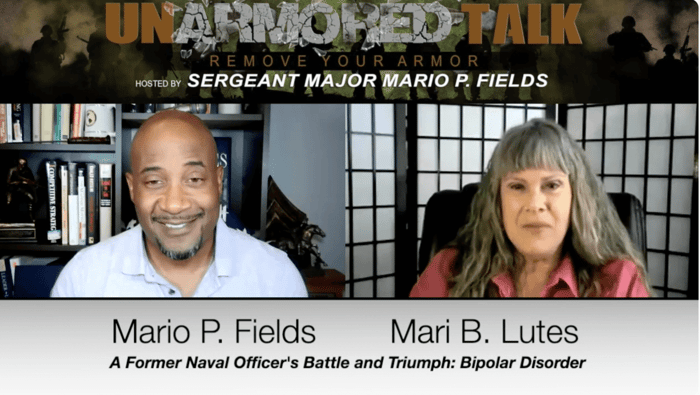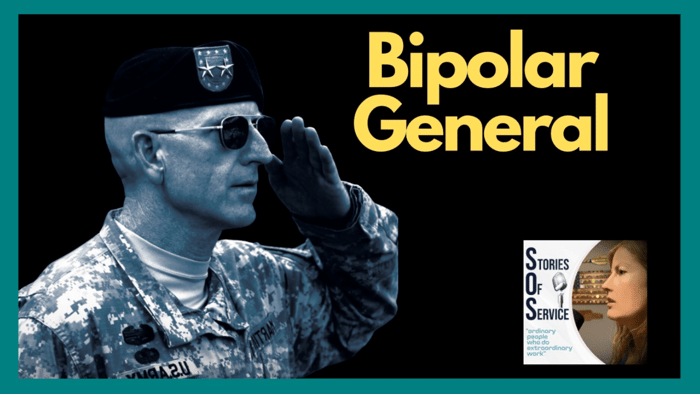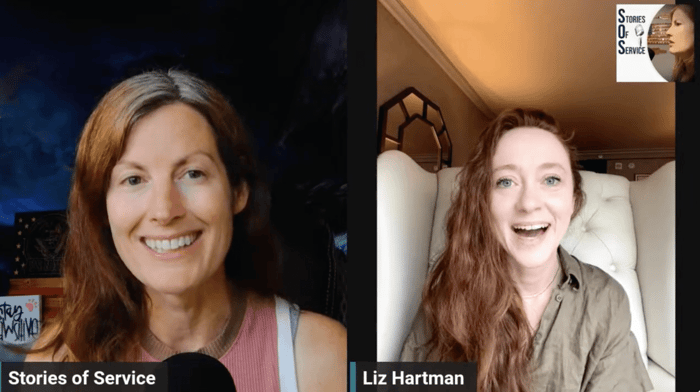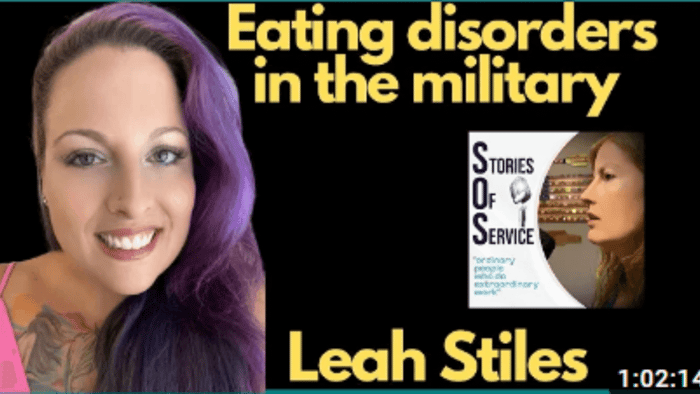In this episode of the Unarmored Talk podcast, Mario P. Fields welcomes Mari B. Lutes, a Navy veteran, author, and life coach. Mari opens up about her personal journey with bipolar disorder, discussing her diagnosis, emotions, and coping mechanisms. She shares her experiences with substance abuse and the challenges she faced in relationships. Mari emphasizes the importance of treating both mental health disorders and substance abuse simultaneously. She also provides advice for parents dealing with a potentially bipolar teenager and encourages individuals with bipolar disorder to take control of their lives by educating themselves and managing their condition. To learn more about Mari and her book, "Is This a Spiritual Awakening or My Bipolar?", visit her on Amazon.
Meet the Guest: Mari B. Lutes

Today, we're honored to welcome Mari B. Lutes to the Unarmored Talk Podcast. Mari is not just an accomplished professional but also a veteran who has served her country. She's an author, a life coach, and her passion for helping others shines through in all that she does.
Mari served in the U.S. Navy as a Cryptologic officer in the 1980s and has since dedicated her career to assisting service members transition effectively into civilian life. Her work at Camp Lejeune's Transition Readiness Services ensures that those leaving the military have a well-thought-out plan for their future.
🔑 Key Takeaways:
-
Dual Diagnosis Treatment: When dealing with both a mental health disorder and substance abuse, it's crucial to seek treatment that addresses both issues simultaneously. This approach is more effective in achieving long-term recovery.
-
Recognizing Symptoms: Mari's experience as a counselor taught her to recognize bipolar disorder in others by listening for specific keywords and symptomology. Early detection and intervention are vital for managing the condition effectively.
-
Openness and Advocacy: Being open about mental health challenges is essential in reducing stigma. Mari's story is a testament to the power of sharing and advocating for those living with bipolar disorder.
👉🏾Discussion Points: Mari's Journey with Bipolar Disorder
-
It is important to treat both mental health disorders and substance abuse simultaneously.
-
Parents dealing with a potentially bipolar teenager should seek support from groups like Families Anonymous and establish boundaries.
-
Individuals with bipolar disorder should educate themselves about their condition and take control of their lives.
-
Mary's book, "Is This a Spiritual Awakening or My Bipolar?", is available on Amazon.
Listen to Full Episode:
Watch Full Episode:
Resources:
- Book: Mari B. Lute's book, Is This a Spiritual Awakening or My Bipolar, is available on Amazon. It provides a personal perspective on living with bipolar disorder.
- Families Anonymous: Families dealing with loved ones who have bipolar disorder can find support and guidance through organizations like Families Anonymous.
- Dual Diagnosis Treatment Centers: Seek out treatment centers that specialize in dual diagnosis, addressing both mental health and substance abuse disorders simultaneously.
- Watch: Unarmored Talk Playlist
- Mario's Socials: Parade Deck
- Support My Nonprofit: Still Serving, Inc.
- Email: [email protected]
Former Naval Officer's Battle and Triumph: Bipolar Disorder Transcript by Buzzsprout
Mario P. Fields:
Welcome back to unarmor talk podcast. Thank you so much for listening and watching each episode and continue pleased to share with your friends and family members and colleagues, and don't forget to leave a rating or review if you feel this is a awesome show. And you can connect to all of my social media on the parade deck Just look in a show notes or you can put in the search engine Mario P Fields parade deck and get all access To my social media. Well, let's get ready to interview another guest who is willing to remove their armor to help other people. What's going on, everybody? Welcome back to unarmor talk podcast. We have another guest willing to remove her armor to help other people while living. You guys know the deal there's a lot of turbulence while living them, seat belt signs will come on, but at least these amazing guests can give you and share with you how they got through some emotional Challenges and thought through them to kind of reduce those seat belt signs, if you will. And let's get some beverages being served at 37,000 feet. But before we bring on our amazing guests, thank you everyone. Continue to share, continue to watch if you like, watching on YouTube or listen on audio, download and listen and don't forget to leave a rating review. That's the only way I can get better and I just thank you guys. And then on the charity side, we've raised a lot of money. If you guys go on a still serving ink, that's WWWsteelservingcom. Check out the latest news and everything we've been doing, donating thousands of dollars to continue to make sure that, when we die our Nation, the world is in better hands with today's youth who will become tomorrow's Professionals. So I'm done with the admin. Done with that stuff. Mary Beth Lutz, welcome to unarmor talk podcast.
Mari B. Lutes:
Thank you, mario, thanks for having me.
Mario P. Fields:
No, you are welcome and everyone. I get to see her too when I'm on base doing something you know, facilitating some employment workshops. It's pretty cool to see. You'll marry with her professional, self-adolescent self who cares about people. But before I turn over to our amazing guest today, she is a veteran. She served in our military I'll let her tell you what branch and she's an author and life coach. And she does more than that. Welcome to the show and please can you share a little bit about yourself with our listeners and viewers, mary?
Mari B. Lutes:
Hey, I've been a life coach for about four or five years. I've published author. The book is called is this a spiritual awakening or my bipolar? I also am a Navy veteran and I was a cryptologic officer in the Navy back in the 80s. And those I currently work on basic campus in full-time in their transition readiness services, helping to Make sure that our service members have a good plan when they get out of the military.
Mario P. Fields:
Yeah then, what an important task. And but you mentioned, you know, let's get right into it. You know one you mentioned the Navy and so, just so you know, I have a special place in my heart for the Navy. I knew that. I just wanted you to share that because my wife's a Navy veteran. So I love sailors, I love you guys, and if I didn't say I love you, you know the the bandwidth might get shut off because my wife, she, is one of the most motivated sailors I've ever met. But thank you for serving Mary and let's talk about it. You know you mentioned, you know your, your amazing book, and in that title you mentioned the word bipolar. What's the connection to you in?
Mari B. Lutes:
A year 2000, I was properly diagnosed with bipolar disorder. And prior to that, they had diagnosed me with depression and anxiety. I had my first breakdown at 21 in college at the University of South Carolina, where I was in nrotc and had a breakdown and nothing happened, didn't go to the hospital, I didn't do anything. I went to the Chaplain on the campus and he just said okay, don't hurt yourself and go to drill. Wow, so that's.
Mario P. Fields:
So so you mentioned you were, you were accurately right, properly diagnosed and, and we'd say, 20 2000. Yeah, 2000. So between 2000 and when you were in you know, in South Carolina how much time in between that journey.
Mari B. Lutes:
A lot of years I sort of learned to adapt. I learned coping skills when I was horribly depressed. At the same time I developed a very bad drinking problem and used alcohol to self-medicate and it helped a lot for a lot of things, and then until it didn't, and so eventually I got sober in 1993 and it took me seven and a half more years to recognize that I had mental health disorder.
Mario P. Fields:
And a lot of times, you know, I've seen. You know, when people get diagnosed with something like bipolar, you know they feel like there's a stigma, like, oh, I don't want that on me. Did you experience that?
Mari B. Lutes:
I did and at the same time, I was very open. I've always been very open about my diagnosis, because people can't be afraid of admitting that they need help and having a particular diagnosis like bipolar disorder. Whenever you say I my bipolar disorder, instead of saying it's mine, it's, I have a diagnosis of bipolar disorder.
Mario P. Fields:
I like that, wow, I like that. Don't say it's mine. Say, say I have this, and then, what you know, let's move forward. Yeah, and so, when, when, when that happened, what emotions that you experienced, mary, when the doctor said yeah, we, we believe, after all these assessments and reviewing, examining your life, this is what we believe it is. What emotions that you feel after that.
Mari B. Lutes:
No, I was so angry, I was so angry, I was angry at God. I was like, how could you do this to me? I already have a disease that of alcoholism that I have to deal with for the rest of my life, and now you're giving me this one that I have to deal with the rest of my life. But I have always been someone who tackles problems, and so the first thing I did was start reading every single book that I could find about bipolar disorder.
Mario P. Fields:
Wow, Wow, and I, you know, and I love the choice you made instead of running from it and you could have, but instead of running from this, this diagnosis, you said okay, let me, let me gain a better understanding of what. What is this and what did you discover as you're doing this kind of research?
Mari B. Lutes:
Well, the first book that I read was called An Unquiet Mind by Kay Redfield Jamison, and it's her story. She is one of the leading psychiatrists in the world on bipolar disorder and she has it herself, and so her story of a professional person having bipolar disorder and still succeeding in life gave me hope that I could do the same thing.
Mario P. Fields:
And Mary, I believe that this episode will give so many other people hope from just listening to you and you having the courage to remove your armor to help, not only those who may be diagnosed right now, those who may not even know they have it, and those who will get it in the future. So I love how you're reciprocating that to be able to give people hope and family structure relationships. What happened? Was it very turbulent?
Mari B. Lutes:
Yes, yes, I've been married three times. The second one only lasted three months. But, part of my bipolar disorder was looking to fill that void inside me, and so I didn't have alcohol anymore and I searched out I needed to be needed in order to feel fulfilled. So it, but it was horrible because I'm very impulsive. It's caused me problems financially in relationships with my family. Today I can say that we have an awesome family experience. My parents even spell checked my book for me, so they got to read a lot about my bipolar disorder and some of the wonderful things not so much that I did as part of my drinking and my bipolar disorder, because I always say bipolar disorder to describe it is like Leonardo DiCaprio on the bow of the Titanic when he puts his arms out and he says I'm king of the world. And when I say that to prior patients because I was in substance abuse and mental health counseling for 22 years. But when I asked that question, hey, do you ever feel like Jack on the Titanic? And people are like, yeah, all the time I said no, what happens? And they're like, well, then I crash. Yeah, that's pretty much it. I mean, when I was working I kept myself in my office and played solitaire because I knew that if I left the building I would never come back, wow.
Mario P. Fields:
And you mentioned the substance abuse and the alcohol and things of that nature. How much of that do you believe made it worse? Like, at what level do you think it just made things worse?
Mari B. Lutes:
Probably in college. In college was the worst. And what comes first the chicken or the egg, they don't know. I do know that when you're treating someone with a mental health disorder and a substance abuse disorder, you have to treat them both at the same time. So in other words, if someone's going through a rehab or something, you want to make sure that it's a dual diagnosis rehab so that the person is getting treatment for their mental health disorder and their substance abuse disorder.
Mario P. Fields:
Interesting right? Not separately. Hey, we're going to try to treat this mental health disorder and then let's figure this thing out, and then we're going to go after the substance abuse. You're saying, no, no, you got to do them together. Yeah, especially young folks when I say young, maybe early 20s. Have you ever witnessed yourself or anyone that got this diagnosis in their early 20s and what would you say was the dynamics of that?
Mari B. Lutes:
While I was in substance abuse counseling in Pennsylvania, a lot of my clients patients were college students, and my cats are running around all of a sudden, so I apologize if one of them is on armor thought. So a lot of my patients were late adolescents 18, 19, 20 years old and I would ask them the same questions and then if I heard some of the same symptomology, I'd say I need you to go see our psychiatrist and see what he thinks. But I've gotten very good at recognizing bipolar disorder in people it's. They tell me just a few key words and right away I can pick up on it. So it's kind of like you know you talk to someone and you'll say some Marine Corps jargon and they'll pick right up on that that you are Marine.
Mario P. Fields:
Yeah, that is so accurate. And have you ever seen any behaviors that may people may confuse another disorder with bipolar. Have you ever seen that?
Mari B. Lutes:
Yeah, a lot of times they may say it's a personality disorder, borderline personality or narcissistic personality disorder. You can have both, but a lot of times they'll diagnose someone with borderline which there's really no medication for the personality disorders and perhaps ignore the ups and downs that a person has with their hypomania and mania.
Mario P. Fields:
You know, mary, I know you are. I know for a fact you are doing amazing things. So I can actually say that because everyone I see her in person in the 10 to 20,000 service members and families that transition out of the campus. You're in the area Mary's, right in the middle, so I'm not gonna hold you too much longer so you can continue to do amazing things for those who serve. But looking back, if you had to give and this is two part question what advice would you give to a parent who may be dealing with a teenager or a young adult who may potentially be bipolar number one? And then what advice would you give to someone who has been diagnosed with that disorder? Over to you, mary.
Mari B. Lutes:
Okay. So for parents there are groups like Families Anonymous that will help them with managing their boundaries. For the bipolar disorder it's really hard in this country because we don't have any. No one can say, hey, you need to put this person in the hospital. I know he's my son, I know he's really ill. And until that person says I wanna hurt myself or someone else, then they can't go in the hospital. No one can force anyone to take their medication, they just can't do it. So bottom line is if you have tried and tried and tried, maybe time now to set some boundaries and say you need to be responsible for your mental health disorder and for treating it or dealing with the consequences of not treating it. And to someone who has it, one of my favorite sayings and I gotta admit I saw it on Dr Phil but the dog wags the tail, the tail doesn't wag the dog. In other words, my mental health disorder does not control my life. I learn everything I can about medications, about symptomology, so that I can manage my disorder and not the other way around.
Mario P. Fields:
Mary, I always respected you, but it really just went the heck up out of the selling of my house and maybe it's in the ionosphere for my level of respect for you Everyone. You guys heard it the tail don't wag the dog, the dog wags the tail. Like Mary said, she went through a lot of turbulence but she chose to start to wag that tail and take control of what has been put in her life. Mary, thank you so much for appearing on our talk podcast Again. Can you share with everyone how to find you? How can they get a copy of your book?
Mari B. Lutes:
My book is available on Amazon. It's called Is this a Spiritual Awakening or my Bipolar, and it's a Turquoise book with a very a woman with a veil over her head. So what are we hiding in this? In that book I do a pretty good explanation of the different kinds of bipolar, the different kinds of medication, and then I talk about some of the metaphysical things that can come along with that and get ahold of me. You can get ahold of me at maryloops that's M-A-R-I dot, l-u-t-e-s at yahoocom.
Mario P. Fields:
Thank you so much, mary. I truly appreciate you and I can't wait to see you soon on the base. But until everyone, until next time, you guys know the deal. God bless you all. God bless your family and friends, and be safe out there. Have a wonderful evening, mary.
Mari B. Lutes:
Thanks, you too.
Mario P. Fields:
Thank you for listening to this most recent episode and remember you can listen and watch all of the previous episodes on my YouTube channel. The best way to connect to me and all of my social media is follow me on the Parade Deck. That is wwwparadedeckcom, or you can click on the link in the show notes. I'll see you guys soon.








